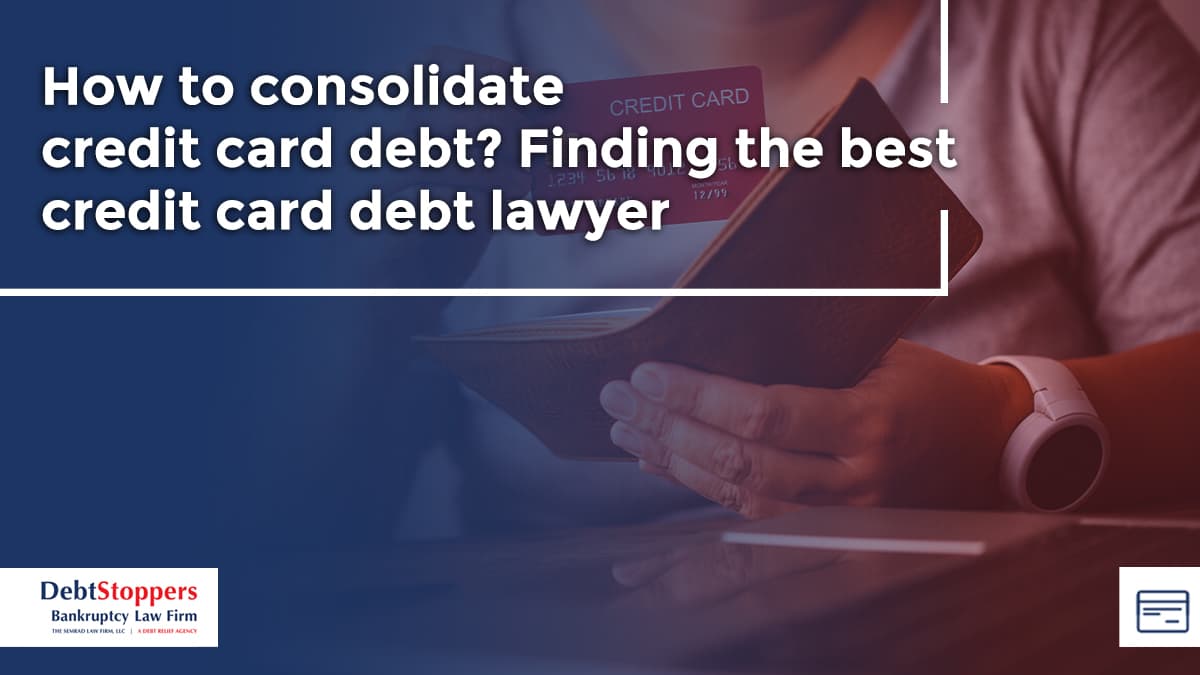How to consolidate credit card debt? Finding the best credit card debt lawyer

Credit card consolidation can be an effective strategy for managing debt, reducing interest costs, and improving financial stability. However, it's essential to carefully evaluate the terms and conditions of the consolidation loan, consider the total cost of borrowing, and ensure that consolidation aligns with your financial goals and needs. Consulting with an experienced credit card debt attorney can help you make informed decisions and create a plan that works for you.

What is credit card debt consolidation?
Credit card debt consolidation is a financial strategy that combines multiple credit card debts into a single loan or repayment plan. The primary goal of credit card debt consolidation is to simplify debt management, reduce interest rates, and potentially lower monthly payments.
With credit card debt consolidation, you bring together all your existing credit card debts into one consolidated loan or repayment plan. Credit card debt consolidation allows you to streamline your debt obligations and make a single monthly payment instead of managing multiple payments to different creditors. Credit card debt consolidation options typically offer lower interest rates, extended repayment terms, or fixed monthly payments.
How can you consolidate credit card debt?
There are several methods you can use to consolidate credit card debt. Some of the most common methods include:
-
Balance Transfer Credit Card - A balance transfer credit card allows you to transfer balances from existing credit cards onto a new card with a lower or introductory 0% APR (annual percentage rate) for a specified period, typically 12 to 18 months. This can provide temporary relief from high-interest rates and allow you to pay off your debt more quickly without accruing additional interest charges. Be mindful of balance transfer fees and make sure to pay off the transferred balance before the promotional period ends to avoid higher interest rates.
-
Debt Consolidation Loan - You can apply for a debt consolidation loan from a bank, credit union, or online lender to pay off your existing credit card debts. Debt consolidation loans typically have lower interest rates than credit cards, allowing you to save money on interest charges and simplify debt management by making a single monthly payment. Shop around for the best interest rates and loan terms, and consider whether a secured or unsecured loan is the best option for your financial situation.
-
Personal Loan - You can also take out a personal loan from a bank, credit union, or online lender to consolidate credit card debt. Personal loans are unsecured loans that can be used for various purposes, including debt consolidation. Compare interest rates, fees, and loan terms from multiple lenders to find the most favorable option. Keep in mind that personal loans may have higher interest rates than secured loans but are still typically lower than credit card rates.
-
Home Equity Loan - If you own a home with equity, you may be able to use a home equity loan or home equity line of credit to consolidate credit card debt. These loans typically offer lower interest rates than credit cards because they are secured by your home's equity. Using your home as collateral means you risk losing it if you are unable to make payments, so proceed with caution and only consider this option if you are confident in your ability to repay the loan.
Before consolidating credit card debt, carefully evaluate your financial situation, compare consolidation options, and consider the total cost of borrowing. Make sure to choose a consolidation method that aligns with your goals, budget, and ability to repay the debt.

Pros of consolidating credit card debt
Credit card consolidation offers several potential benefits for people looking to manage their debt more effectively and reduce financial stress. One of the primary advantages of credit card consolidation is that it simplifies debt management by combining multiple credit card debts into a single loan or repayment plan. Instead of juggling multiple payments to different creditors, you only need to make one payment toward your consolidation loan.
Some of the benefits of credit card consolidation include lower interest rates, fixed monthly payments, extended repayment terms, extended repayment terms, improving your credit score, and improving your financial discipline.
Overall, credit card consolidation can be an effective strategy for managing debt, reducing interest, and improving financial stability. However, it is important to carefully evaluate the terms and conditions of the consolidation loan, consider the total cost of borrowing, and ensure that consolidation aligns with your financial goals and needs.
Reduced number of payments
Credit card debt consolidation often reduces the total number of payments you need to make each month. When you consolidate multiple credit card debts into a single loan or repayment plan, you are essentially combining all your existing debts into one consolidated payment.
Instead of managing multiple payments to different creditors with varying due dates, interest rates, and terms, you make one monthly payment toward your consolidation loan or debt management plan. This can simplify debt management, reduce the risk of missed or late payments, and make it easier to keep track of your finances.
By consolidating your credit card debts, you can streamline your repayment process and focus on paying off a single loan or plan. This can help you stay organized, avoid confusion, and make progress toward becoming debt-free more effectively. While consolidating credit card debt can reduce the number of payments you need to make, it is essential to address the underlying financial habits and behaviors that led to the accumulation of debt in the first place. Creating a budget, practicing responsible spending and saving habits, and seeking financial education or counseling can help you avoid falling back into debt after consolidating.
Lower interest rates
One of the main advantages of credit card debt consolidation is the potential to secure a lower interest rate on the consolidation loan compared to the interest rates on your credit cards. A lower interest rate can help reduce the overall cost of borrowing and save you money on interest charges over time.
Improved credit score
Consolidating credit card debt can also have a positive impact on your credit score, especially if you're able to reduce your credit utilization ratio (the amount of available credit you're using). By paying off your credit card balances and consolidating them into a single loan, you may lower your credit utilization ratio, which can improve your credit score over time.
Cons of credit card debt consolidation
While credit card debt consolidation can offer several benefits, it's essential to consider the potential drawbacks and challenges associated with this approach. Some cons of credit card debt consolidation include the risk of accumulating more debt, the potential to pay more interest, a potential negative impact on credit score, the risk of losing collateral, and the possibility of paying higher fees.
It’s important to note that credit card debt consolidation may not be the best option for everyone, especially if you're struggling with severe financial hardship, facing legal action from creditors, or considering bankruptcy. In some cases, alternative debt relief options or financial strategies may be more appropriate for addressing your financial challenges.
May pay more due to compounding interest
It is important to know that it’s possible to pay more due to compounding interest. In general, compounding interest refers to the process by which interest is calculated on the initial principal balance of a loan and any accumulated interest from previous periods. In essence, it's interest on interest.
The compounding period is the frequency at which interest is calculated and added to the principal balance. At the end of each compounding period, interest is calculated based on the current principal balance. This interest is then added to the principal, resulting in a new, higher balance for the next compounding period. The process of calculating interest on the new principal balance and adding it to the original balance is repeated over multiple compounding periods, leading to exponential growth in the total amount of interest owed over time.
Understanding the concept of compounding interest is crucial for making informed financial decisions, especially when choosing an option for consolidating credit card debt.
Debt consolidation doesn’t help with irresponsible financial habits
Consolidating debt does not address the underlying financial behaviors that led to accumulating debt in the first place. It's essential to address spending habits, budgeting, and financial discipline to avoid falling back into debt after consolidation.
How to find the best credit card debt lawyer?
Finding the best credit card debt lawyer involves thorough research and consideration of various factors. It’s important to research attorneys who specialize in debt relief, bankruptcy, or consumer law. You can search online directories, legal referral services, or bar association websites to find qualified lawyers in your area. Look for attorneys with experience handling credit card debt cases and positive reviews from past clients.
It is wise to evaluate an attorney’s experience handling credit card debt cases. Consider how long they have been practicing law, their track record of success, and their familiarity with relevant laws and regulations. An attorney with extensive experience in debt-related matters is more likely to provide effective representation.
Next, schedule consultations with the attorneys you are interested in hiring. You can contact multiple attorneys to schedule initial consultations. Many lawyers offer free or low-cost consultations to discuss your case and assess your options. Use this opportunity to ask questions, discuss your concerns, and evaluate the attorney's communication style and approach to handling your case.
You should also inquire about the attorney's fee structure and payment options upfront. Some attorneys charge hourly rates, while others may offer flat fees or contingency arrangements. It’s important to understand how much the attorney will charge for their services and any additional costs associated with your case.
You should select an attorney whom you feel comfortable communicating with during the initial consultation. A good credit card debt lawyer should listen to your concerns, answer your questions promptly, and keep you informed about the progress of your case. Trust your instincts and consider your comfort level with each attorney you meet. Choose a lawyer who makes you feel comfortable, confident, and supported throughout the legal process.
By following these steps and conducting thorough research, you can find the best credit card debt lawyer to help you navigate your debt-related legal issues and achieve a favorable outcome.





